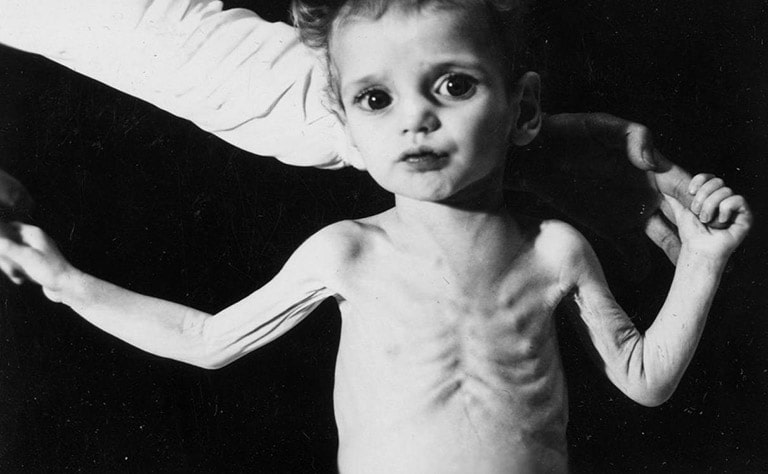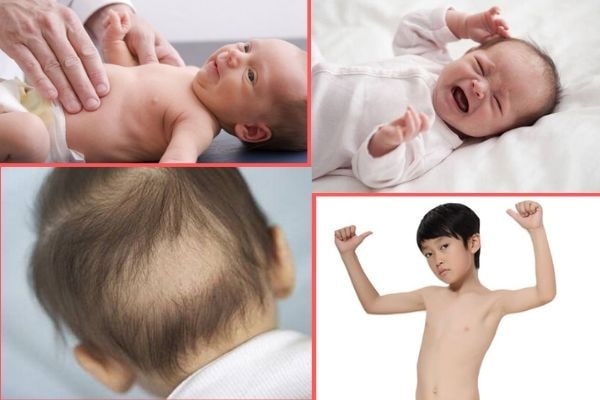Rickets in children is a common disease in all countries, inhibits the baby's comprehensive development if not treated properly. Therefore, parents need to clearly understand the causes, Recognize signs and effective treatment methods. Let's learn about rickets in children through the following article!
What is rickets in children??
Rickets is a type of bone dystrophy that occurs in children due to vitamin D deficiency or vitamin D metabolism disorders in the body.. This usually happens in younger children 3 tuổi, causes bones to become deformed and can lead to serious problems such as infections and pneumonia.
Rickets in children
In Vietnam, Rickets accounts for about 20-40%, which contains approx 8,9% severe case. Statistics from the National Children's Hospital show that approx 10% Children who came for examination were diagnosed with rickets, which includes 35% younger children 3 tuổi.
At the Department of Child Nutrition Consulting, National Institute of Nutrition, The rate of children diagnosed with rickets is much higher: year 2003 To be 65,8%, year 2014 To be 39,1%, mainly focuses on younger children 2 tuổi. This demonstrates the seriousness of the vitamin D deficiency problem and the major impact on children's health in Vietnam..
Is rickets in children dangerous??
Children with rickets, if not treated promptly, can experience dangerous complications. These complications include bone deformities, bowl foot, hunchback and limited respiratory function. If not treated properly, Rickets can affect a child's overall development, increases the risk of bone fractures and affects the nutritional system, physiology of the body.
Face these serious consequences, Raising awareness and taking preventive measures are important conditions to protect children's bone health.
Causes of rickets in children
The cause of rickets in children is due to a deficiency or metabolic disorder of important nutrients such as vitamin D, calcium and phosphate. Vitamin D deficiency is the main cause, disrupts the absorption of calcium and phosphate in bones. The specific causes can be classified as follows:
Fetal rickets
Usually occurs when pregnant women do not provide enough calcium and vitamin D to the fetus during pregnancy. This often happens in pregnant women with multiple pregnancies, premature birth or twins. Demand increased in 3 last month of pregnancy, Special attention should be paid to avoid this situation.
Rickets in children 6 month old
The cause is due to newborns and small children 6 months often do not get enough vitamin D necessary for bone formation. In many other cases, a decrease in the quality of breast milk is also an important factor contributing to the condition of children with rickets..
Causes of rickets in children
Rickets in older children 6 month old
Most children get sick due to living in environments with poor light and poor nutrition. Lack of calcium and vitamin D in the daily diet may be the cause, especially when entering an important stage of development.
Signs of rickets in children
Signs of rickets in children can be expressed through a number of symptoms and changes in the child's health. Below are important signs that parents should pay attention to:
- Soft skull, thin (musculoskeletal): Children may develop early deformities of the bones of the head, causes the skull to become soft, thinner than normal children.
- Startles and restless sleep: Children with rickets may often experience startles and wake up multiple times during the night, affects sleep quality.
- Night sweating: One of the common symptoms is that children may sweat a lot, especially in the head area when sleeping.
- Ring hair loss: Rickets can cause hair loss in the coronal area.
- Crying a lot: Babies may become more fussy than normal babies, may be due to discomfort or pain from rickets.
- Soreness, tenderness in limb bones: Children may complain of pain in bony areas such as the limbs, pelvis and spine.
- Slow growth in height: Children with rickets often grow slowly in height compared to children of the same age.
- Loss of appetite and malnutrition: Due to the effects of the disease, Children may become anorexic and experience malnutrition.
- Frequent cramps: Rickets can increase the risk of muscle cramps and related muscle problems.
- Bones break easily: Children's bones are weaker and more fragile than those of healthy children, This can be a clear sign of rickets.
Any signs that appear need to be evaluated by a specialist for an accurate diagnosis and appropriate treatment options..
Signs of rickets in children.
Methods of treating rickets in children
Bask in the morning sunlight for children every day
Children need to be bathed in sunlight in the early morning or late afternoon. Daily sunshine time depends on age, skin type and health status of the child. Sunlight helps the body produce its own vitamin D – Important substance for calcium and phosphorus absorption, Ensures healthy bone development.
Supplement vitamin D3, K2 and Calcium
The doctor will decide the specific dosage and type of supplement appropriate to the health condition of the child with rickets. Vitamin D3 helps improve calcium absorption from the intestinal tract, while vitamin K2 shapes calcium properly, Avoid excessive calcium accumulation. Calcium supplementation helps develop and protect bones, especially during development.
Methods of treating children with rickets
Take medicine
Supplements may contain vitamin D, K2, Calcium and phosphate to ensure adequate supply of nutrients for bone development. Dosage and duration of use are adjusted according to your doctor's instructions. Periodically rechecking blood indicators such as vitamin D and calcium will help monitor the effectiveness of treatment.
Change your diet, living
The diet needs to ensure adequate calcium supply from foods such as milk, fish, Green vegetables and foods rich in vitamin D. Physical activity, like light exercise, Also supports bone development. Avoid foods rich in caffeine, Soft drinks and foods contain many additives that can affect calcium absorption.
Remember that, All decisions about treating rickets in children need to be discussed and closely monitored by a professional medical team to ensure safety and effectiveness..
Prevention of rickets in children

Rickets in children can affect the child's bone health and overall development in the future if parents do not know how to prevent it.. Below are important preventive measures to help protect bone health for parents:
- Let your baby bask in the sun every day: Expose your child to sunlight in the early morning or late afternoon. Make sure the sunshine time is suitable, depending on the child's age and health condition.
- Provide a varied and balanced diet: Supplement your daily diet with calcium-rich foods like milk, fish, Green vegetables and foods high in vitamin D. Make sure your child gets the nutrients they need for healthy bone development.
- Supplement vitamins and minerals: Discuss the use of vitamin D supplements with your doctor, K2, calcium and phosphate, if necessary. Adjust dosage and supplement type based on precise instructions from your healthcare professional.
- Encourage your baby to be active: Encourage children to participate in gentle physical activities such as walking, cycling, or participate in sports activities. Exercise helps improve bone health and aids in calcium absorption.
- Get regular checkups and doctor visits: Periodically check blood indicators such as vitamin D and calcium to monitor child development. Visit your doctor to assess your bone health and get accurate advice.
- Minimize factors that cause children to have rickets: Limit your baby's intake of foods rich in caffeine and soft drinks that can affect calcium absorption. Besides, Parents need to avoid the habit of smoking, because it can damage the child's bone structure.
Hismart milk is imported in whole cans from New Zealand and Germany. The product also complies with the calcium-phosphorus ratio of Codex standards, which is confirmed by pediatric nutrition experts to have special significance in the development of the musculoskeletal system of young children. Hismart milk is also present 25 Vitamins and minerals help your baby have a balanced nutritional system, vitamin D supplements, Vitamin K supports calcium absorption. Not only focusing on the baby's physical development, Hismart also focuses on developing children's brains in the first year, Supplementing high DHA content to perfect and inspire creativity, wisdom for children. The ingredients 2'FL HMO and Nucleotides found in breast milk are also increased in Hismart milk to help children have a healthy natural immune system.. Supplementing a balanced nutritional system with adequate vitamins and nutrients from Hismart helps children and their families build a solid foundation for a healthy and comprehensive future in the future..
The article is evaluated by BS. Nguyen Ngoc Sang – Head of Kidney and Urology Module, Former Head of Pediatrics Department - Hai Phong University of Medicine and Pharmacy





















